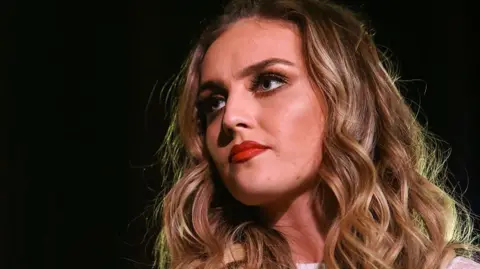**Little Mix Star Discusses the Heartbreak of Losing Her Baby at 24 Weeks**
In a heart-wrenching revelation, Perrie Edwards, a member of the famed British girl group Little Mix, has disclosed her traumatic experience of losing a baby at 24 weeks. The 32-year-old singer opened up about this deeply personal loss for the first time during an episode of Paul C Brunson’s podcast titled *We Need To Talk*. Edwards shared the emotional turmoil and grief that enveloped her following the heartbreaking news of her pregnancy’s abrupt ending.
Perrie revealed that she became pregnant less than a year after the birth of her first son, Axel, who was born in August 2021. Tragically, after reaching the five-month mark, she was blindsided when a routine scan revealed that her baby’s heart had stopped beating. Edwards described that day as “the worst day of my life,” vividly recalling her despair. “I remember sobbing,” she recounted while trying to fight back tears. “I couldn’t see straight. I was just distraught. We basically lost the baby at, like, 24 weeks.”
During the podcast interview, Edwards commented on the shocking moment of the scan, labeling it “an out-of-body experience.” She found it incredibly hard to process the devastating news imparted by the doctor. The gravity of the situation dawned on her most poignantly when her fiancé, former Liverpool footballer Alex Oxlade-Chamberlain, gently placed his hand on her leg and murmured, “Oh no,” indicating that they were facing something profoundly serious.
Despite the traumatic experience, Edwards expressed solace in the way fellow musician Myleene Klass, who was recently honored with an MBE for her advocacy surrounding miscarriage, approached the topic. Klass once shared that even after a miscarriage, the baby remains a part of a parent’s life, a sentiment that resonated deeply with Edwards. “I was like, ‘Oh wow, that’s so magical,’” Edwards reflected, contemplating how this perspective helps her cherish the memory of her lost child.
Furthermore, Edwards shared that Axel, who is about to turn four, is considered a “rainbow baby,” a term denoting a child born after a family has experienced loss through miscarriage or stillbirth. This significant detail added layers to Edwards’ emotional narrative, as she disclosed that she had previously encountered an early miscarriage with her first pregnancy. She recalled the confusion that ensued when doctors informed her there was no visible baby during a scan.
The emotional toll taken by her second miscarriage at 24 weeks was profound. Edwards explained that the anticipation of caring for a fully developed baby, complete with nursery planning, makes any loss at that stage extraordinarily painful. She admitted that until now, she had kept these experiences private, mentioning that only close friends and family were aware of her distress during this time.
Edwards’ unfortunate tales of pregnancy loss are not isolated incidents. In the UK, statistics indicate that approximately one in five pregnancies concludes in miscarriage, with around 2,000 terminations occurring due to prenatal complications annually. A 2017 report on aftercare for women recovering from such losses highlighted the disparity in the care received, with many finding the experience inconsistent and distressing. In response, the Department of Health and Social Care announced measures aimed at improving the support women receive after miscarriage, which is a positive development for those affected.
Throughout the podcast, Edwards also reflected on her relationship with One Direction star Zayn Malik, which blossomed while she was a participant on *The X Factor* in 2011. She shared insights into how their engagement had subsequently unraveled amidst a swirl of controversies and public scrutiny, which she now recognizes with a critical lens as a toxic relationship.
As Edwards continues to navigate her life and career following her revelations on this podcast, her heartfelt discussions about pregnancy loss open the door to greater awareness and compassion surrounding women’s health challenges. Through sharing her story, Edwards not only serves as encouragement to others facing similar struggles but also amplifies the ongoing conversation about maternity and the support systems needed around it.
If you or someone you know has been affected by pregnancy loss, seek out the support you need, as ultimately, no one should navigate such hardships alone.












